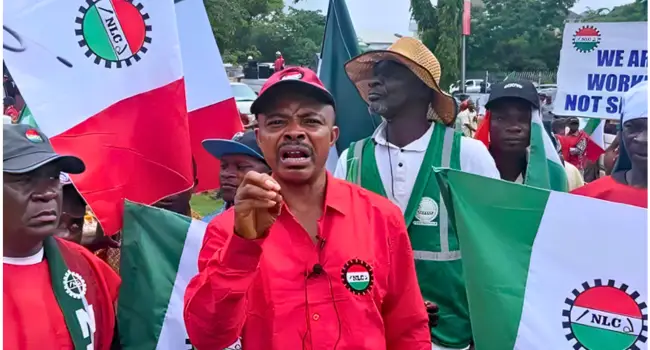NLC sets to meet FG, says petrol price has rendered 70k minimum wage useless
…Insists Tinubu betrayed Labour
The Nigeria Labour Congress, NLC, said Thursday it would meet with the federal government on how workers could survive the recent hike in the pump price of petrol.
According to the labour movement, the current price of petrol has eroded the gains of the yet-to-be implemented N70,000 new national minimum wage. President of NLC, Joe Ajaero, who disclosed this at the opening ceremony of a two day workshop on “Minimum Wage Implementation Workshop, Southern Zone, with the theme ‘Strategies for Effective Implementation of the 2024 National Minimum Wage Act, in Lagos,” insisted that organised labour was deceived by President Bola Tinubu into accepting the N70,000 minimum wage to forestall petrol price increase .
He advised the government to address the excruciating hunger, poverty and frustration of Nigerians before things go out of hand, lamenting that Nigerians were really suffering.
While giving insight into the conversations with President Tinubu before the N70,000 minimum wage was agreed, the NLC president lamented that Nigerians appeared to have started adjusting to the situation on ground because the government had been distracting organized labour.
“There is a tactic to distract our attention, to call us names, level allegations against us over cybercrime, financing terrorism, sponsoring terrorism and the rest.
”Those things have paid off because while we are facing those allegations, this issue of pump price has remained.
“I repeat, we were betrayed by Mr President, That statement we issued over our being betrayed is being denied by officials of the government. I am repeating it that we were betrayed. Some of you here were at the meeting when Mr President said, Ajaero you are the problem.
”Since we said subsidy is gone. You don’t want to allow us to increase again. If you allow me to increase we will pay you that N250, 000. Immediately I came out that day I was on Arise Television I repeated what Mr President told us.
”The president said I am giving you one hour to decide on this and get back to me. He said he was goig back to his office and we should decide over this (between N250, 000 minimum wage and petrol pump price hike).
“We said no sir, Mr President; we can’t be holding our meeting here in your office. Let us take one week break and come back and report back to you. He said okay, I am traveling but I will cancel my trip for one week. That was how we adjourned for one week.
”If you followed the trend of those negotiations, we adjourned for one week. And when we came back after consultations, we said to Mr President, no, we can’t allow you to increase to any length because that will affect all Nigerians and we will be seen to be selfish. ”Even the N250,000 will not be useful to us. If we continue to increase salary, it will make a mess of our economy and then you continue to increase pump price. In fact, that N250,000 may not be enough to even buy fuel.
“Mr President equally offered to fund our trip to tour some West African countries, where the least price of petrol is selling at N1,700. He even said in Cameroon, they are selling N2000 and that none of them has a refinery but they are getting their products from Nigeria.
”We responded by telling him to check the borders because that is why they are smuggling those products to those countries. ”We equally said no because Nigerians will say they have given us money; they won’t say it’s money for us to visit those West African states.
“On the adjourned date, we went there and told Mr President, we are not here for increase in pump price or negotiation. So let’s concentrate on the minimum wage. Some of these things informed the acceptance of N70,000 minimum wage which some of us here were saying was not enough. But some people are still saying they cannot pay that N70, 000. ”This is the dilemma all of us are facing. In fact, the private sector employers in our meeting gave us tough time. They refused to shift and they wanted to vote with state government, federal government and the private sector on one side, all against labour on the other side. These were some of the things that necessitated all those walkouts you saw.”










Add Comment